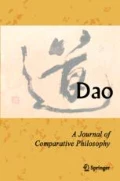Abstract
In all three versions of the “Jian’ai” 兼愛 Chapter in the Mozi 墨子, variations of a central argument may be found. This argument proceeds by advancing a diagnosis for what causes the various evils that beset the world, and it is on this basis that the Mohists propose jian’ai as the solution. The study examines this main argument in some detail, with the aim of improving both our understanding of the Mohist ethical doctrine and also our appreciation of their argumentative practices. The study shows that distinct ethical injunctions of varying degrees of stringency can be derived from the argument, though they all embody an underlying notion of impartiality. This impartiality—while in many ways recognizably attractive to us—puts Mohist jian’ai in tension with certain notions regarding the ethical significance of special relations. In addition, the paper argues that the Mohists main argument for jian’ai contains a critical flaw.
Similar content being viewed by others
References
Defoort, Carine. 2005/6. “The Growing Scope of ‘Jian 兼’: Differences Between Chapters 14, 15 and 16 of the Mozi.” Oriens Extremus 45: 119–140.
Fraser, Chris. 2012. “Mohism.” The Stanford Encyclopedia of Philosophy. Fall 2012 Edition. Edward N. Zalta ed. URL = http://plato.stanford.edu/archives/fall2012/entries/mohism/
Godwin, William. 1926 (1793). Enquiry Concerning Political Justice and Its Influence on General Virtue and Happiness, Edited by R. Preston. New York: Knopf.
Graham, Angus C. 1985. Divisions in Early Mohism Reflected in the Core Chapters of Mo-tzu. Singapore: Institute of East Asian Philosophies.
_____. 1989. The Disputers of the Tao: Philosophical Argumentation in Ancient China. La Salle: Open Court.
Harbsmeier, Christoph. 1981. Aspects of Classical Chinese Syntax. Scandinavian Institute of Asian Studies Monograph Series, No. 45. London: Curzon.
Hsiao, Kung-chuan. 1979. A History of Chinese Political Thought Vol. 1: From the Beginnings to the Sixth Century A. D., trans. by F. W. Mote. Princeton: Princeton University Press.
Hume, David. 1975. Enquiries Concerning Human Understanding and Concerning the Principles of Morals, 3rd ed., Edited by P. H. Nidditch Oxford: Clarendon Press.
Ivanhoe, P. J., trans. 2001. “Mozi.” In Readings in Classical Chineses Philosophy, 2nd ed., edited by P. J. Ivanhoe and Bryan W. Van Norden. Indianapolis: Hackett.
Johnston, Ian. 2010. The Mozi: A Complete Translation. New York: Columbia University Press.
Knoblock, John and Jeffrey Riegel, J. 2013. Mozi: A Study and Translation of the Ethical and Political Writings. China Research Monograph 68. Berkeley: Institute of East Asian Studies.
Liang, Qichao 梁啟超. 1975. Mozi Xue’an 墨子學案. Taipei 台北: Xinwenfeng Chubanshe 新文豐出版社.
Mackie, J. L. 1974. The Cement of the Universe. Oxford: Clarendon Press.
Mei, Yi-pao. 1929. The Ethical and Political Works of Motse. London: Arthur Probsthain. [Chapters 1–39, 46–50]
Nivison, David. 1996. The Ways of Confucianism: Investigations in Chinese Philosophy, edited by Bryan W. Van Norden. La Salle: Open Court.
Robins, Dan. 2012. “Mohist Care.” Philosophy East and West 62: 60–91.
Van Norden, Bryan W. 2007. Virtue Ethics and Consequentialism in Early Chinese Philosophy. New York: Cambridge University Press.
Wang, Fengyang 王鳳陽. 1993. Gu Ci Bian 古辭辨. Changchun 長春: Jilin Wenshi Chubanshe 吉林文史出版社.
Watson, Burton, trans. 1963. Mo Tzu: Basic Writings. New York: Columbia University Press.
Author information
Authors and Affiliations
Corresponding author
Rights and permissions
About this article
Cite this article
Loy, Hc. On the Argument for Jian’ai . Dao 12, 487–504 (2013). https://doi.org/10.1007/s11712-013-9346-x
Published:
Issue Date:
DOI: https://doi.org/10.1007/s11712-013-9346-x




